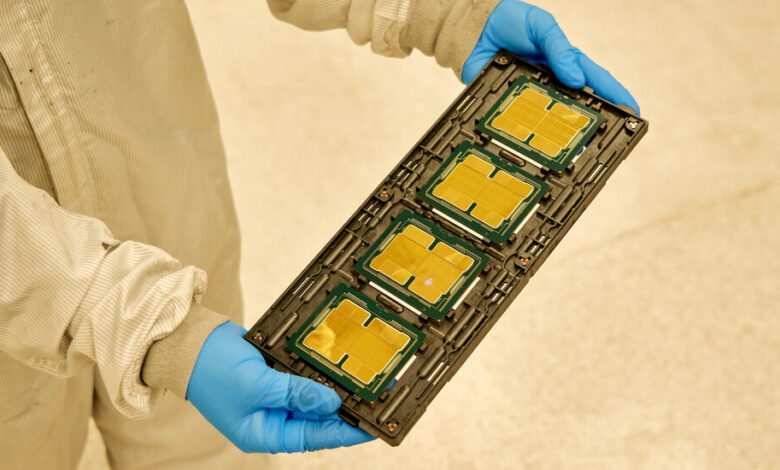
The Biden administration has announced additional limits on the sales of advanced semiconductors by American companies, strengthening the restrictions that were issued last October. The purpose of these limitations is to curtail China’s progress in supercomputing and artificial intelligence. The new rules are expected to significantly reduce shipments of advanced semiconductors from the United States to Chinese data centers, which use them for AI model production. American companies seeking to sell advanced chips or the machinery used to manufacture them to China will need to notify the government or obtain a special license. Moreover, chip makers will be required to obtain licenses to ship to other countries that are under U.S. arms embargoes. The reason behind these restrictions is the concern that China’s access to advanced technology could assist its military capabilities, such as guiding hypersonic missiles or cracking U.S. codes. There is also the concern that if not properly controlled, the technology could pose serious threats to humanity.
However, it’s important to note that artificial intelligence also has valuable commercial applications that can transform various industries. These tougher restrictions may affect Chinese companies like ByteDance (the parent company of TikTok) and Baidu, as they have been trying to develop AI chatbots. Additionally, these restrictions could have long-term implications on China’s economy, given the significant role AI plays in industries such as retail and healthcare. U.S. chip makers, including Nvidia, AMD, and Intel, may also be impacted by the limitations as they earn a substantial portion of their revenue from Chinese buyers. Some of these companies have been lobbying against tighter restrictions in recent months.
The U.S. officials have clarified that the rules exempt chips used purely in commercial applications, such as smartphones, laptops, electric vehicles, and gaming systems. Most of these rules will take effect in 30 days, with some becoming effective sooner. The Semiconductor Industry Association, which represents major chip makers, has acknowledged the need to protect national security but also expressed concerns that overly broad controls could harm the industry without advancing security.
Nvidia, one of the major beneficiaries of the AI boom, has said that it complies with all applicable regulations and does not expect a significant immediate impact on its financial results due to the global demand for its products. However, the stock price of Nvidia fell by approximately 5 percent following concerns about the new performance limits on a wider range of chips.
The Biden administration has ramped up efforts to counter China’s growing dominance in cutting-edge technologies by investing in new chip factories in the United States. Simultaneously, they have been implementing restrictions on technology exports to China that could have military applications while allowing other trade to flow freely. This strategy aims to protect American technology while maintaining economic growth. However, determining which technologies pose real threats to national security has been a challenge. Major semiconductor companies argue that overly restrictive trade bans can hinder their revenue and investment in the United States. Some critics also believe that these restrictions could push China to develop alternative technologies, potentially weakening U.S. influence globally. While China has made progress in developing domestic versions of advanced chips, it still lags behind Western capabilities.
Furthermore, the United States has placed two Chinese chip design companies and their subsidiaries on an “entity list,” which requires special permission for U.S. companies to ship materials to them. The U.S. government has also announced the creation of a new “gray list” that requires makers of certain less advanced chips to notify the government if they are selling them to China, Iran, or other countries under U.S. arms embargoes.
The effects of these controls on China’s ability to reach the technological forefront in large-scale AI models are anticipated to be more apparent as non-Chinese companies introduce more advanced versions of their current products. This could have broader implications for the Chinese economy, as AI has the potential to be a game changer for productivity growth in the coming decades.
Overall, these restrictions on high-tech chip sales to China for AI development reflect the ongoing geopolitical tensions between the U.S. and China. Both countries recognize the importance of advanced technology in various sectors, including national security and commercial applications. Balancing the need for national security with the potential negative impact on economic growth and global influence is a complex challenge that requires careful consideration and constant reassessment as technology continues to advance.




